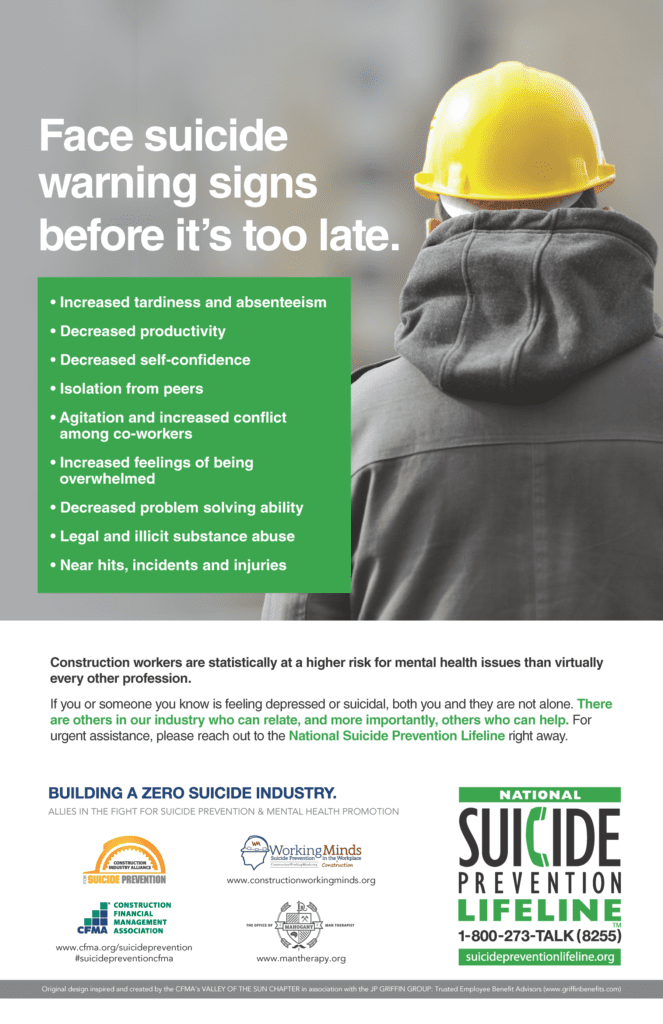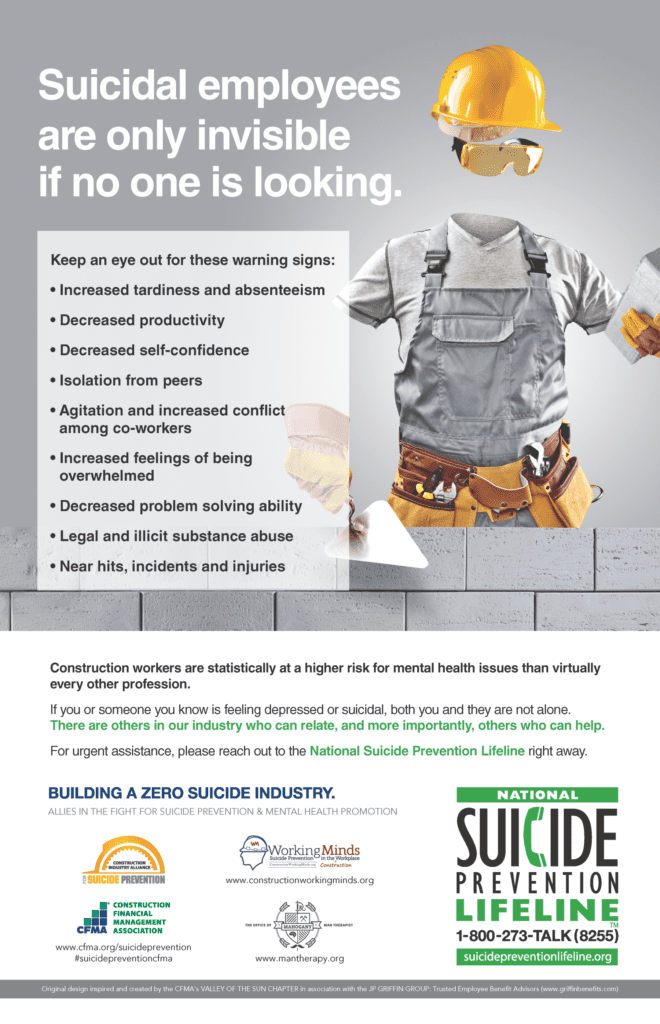Industry challenges, tough-guy culture heighten suicide risk for construction workers
Tracie Canby placed her semi-colon tattoo deliberately and prominently on her right wrist in honor of her brother and in hopes of preventing other tragedies.
An employee benefits specialist with RCM&D, Canby watched her brother, a construction professional and owner of a thriving firm, struggle for years with depression. Declining treatment, he self-medicated with alcohol instead. Occasionally, he mentioned suicide, but swore he would never do it. Then one Saturday night, after talking his way out of an in-patient psychiatric facility, he took his own life. He was just 49 years old.
Canby subsequently became a volunteer with non-profits that focus on mental health awareness and suicide prevention. She also got the tattoo. A symbol of suicide awareness, the semi-colon represents a pause in a sentence, not an end. The symbol encourages individuals who are struggling with mental health issues to pause and seek help, rather than end their lives.
“A lot of people said, you’re in business. A tattoo near your right hand will be obvious when you shake hands,” Canby said. “But I want to have these conversations… The statistics of suicide in the construction industry really break my heart because this situation is preventable.”
According to the Centers for Disease Control and Prevention, construction workers suffer higher suicide rates than any other occupational group in America. The industry’s suicide rate is more than 49 people per every 100,000 workers. That is nearly four times the national average for suicide. It is also five times the number of construction workers who die from all other job-related causes annually.
Those tragically high rates are partly due to the demographics of an overwhelmingly male workforce. Men, especially aged 25 to 54, experience higher levels of suicide than other populations. The industry also employs many veterans who experience extraordinarily high suicide rates. But other factors contribute to mental health challenges and suicide risks within the construction industry.
“So many of the things that make this industry great are also risk factors for suicide,” said Michelle Walker, Past Chairperson of the Construction Industry Alliance for Suicide Prevention (CIASP). “We love that builders are tough and want to get things done at all costs. They are dedicated and they will work crazy hours… But so many of the things we love about this industry can also make it a tinderbox for tragedy.”
Long hours, long commutes, sleep deprivation, physically strenuous and dangerous working conditions, fast-paced projects, worker shortages, physical injuries and changing project needs can pile stress on a construction worker. Some people opt to self-medicate with alcohol, opioids or other substances, which almost always compounds problems. Workers struggling with stress, anxiety, depression, substance abuse or suicidal thoughts can be distracted at work, become less productive and experience higher risks of onsite accidents. Meanwhile routines that shuttle workers from jobsite to jobsite limit their interpersonal connections and also limit employers’ ability to spot emerging mental health issues.
Furthermore, the challenges are not limited to any particular part of the construction workforce. According to CIASP, “all levels of the construction workforce are at increased risk of suicide, from laborers to skilled trades to management.”
“Project managers and company executives put in long hours, long days that include high pressure to finish projects on time and on budget despite all the challenges that come up along the way,” said Paul O’Connor, a Risk Control Consultant at RCM&D.
Due to workforce shortages and tight profit margins, those managers are often pushed to accomplish more with fewer resources, Walker said. They also function under the “extreme pressures” of knowing that errors in the construction of a bridge, a building or other structure could have catastrophic consequences.
Yet construction companies and construction workers have often resisted addressing mental health issues and suicide risks.
Established in 2016, CIASP “has done four years of full-bore efforts on this issue and it still amazes me how many construction people I talk to on a weekly basis who have no idea about this problem,” Walker said. “It is so underrepresented as a topic of health and safety and workplace culture… If five percent of construction companies are doing something about this, I would say that’s a high estimate.”
Mental health education and services often run counter to the industry’s “tough-guy culture.”
“When it comes to mental health, the feeling among stereotypical construction workers is suck it up and take care of yourself,” Canby said.
That culture also leads to blind spots. When approached about the topics of mental health and suicide risk, most contractors reply they don’t see those problems within their companies, Canby said.
But contractors need to address mental health issues. Several best practices and readily available resources can help those endeavors.
CIASP offers information about suicide prevention, toolbox talks, wallet cards, display posters and hardhat stickers through its website, preventconstructionsuicide.com. It also provides screening tools to help employees identify potential mental health issues, as well as assessment tools and guidelines to help companies establish suicide prevention programs. Until the end of the year, CIASP and LivingWorks are also offering free 90-minute, suicide-prevention training sessions.
To successfully implement mental health and suicide prevention programs, individual contractors need to publicly recognize the importance of good mental health and establish work cultures where individuals can seek mental health services without repercussion or stigma, O’Connor said. Companies need to train all managers, from supervisors to senior executives, on how to address mental health issues and make an Employee Assistance Program readily available to staff.
NEED HELP?
Construction workers are statistically at a higher risk for mental health issues than virtually every other profession.
If you or someone you know is feeling depressed or suicidal, both you and they are not alone. There are others in our industry who can relate, and more importantly, others who can help.
- National Suicide Prevention Lifeline
- Call 1-800-273-TALK (8255)
- www.suicidepreventionlifeline.org
- Construction Industry Alliance for Suicide Prevention
- Construction Working Minds: Suicide Prevention in the Construction Workplace
- Construction Financial Management Association – Suicide Prevention Is a Safety & Health Priority in Construction

